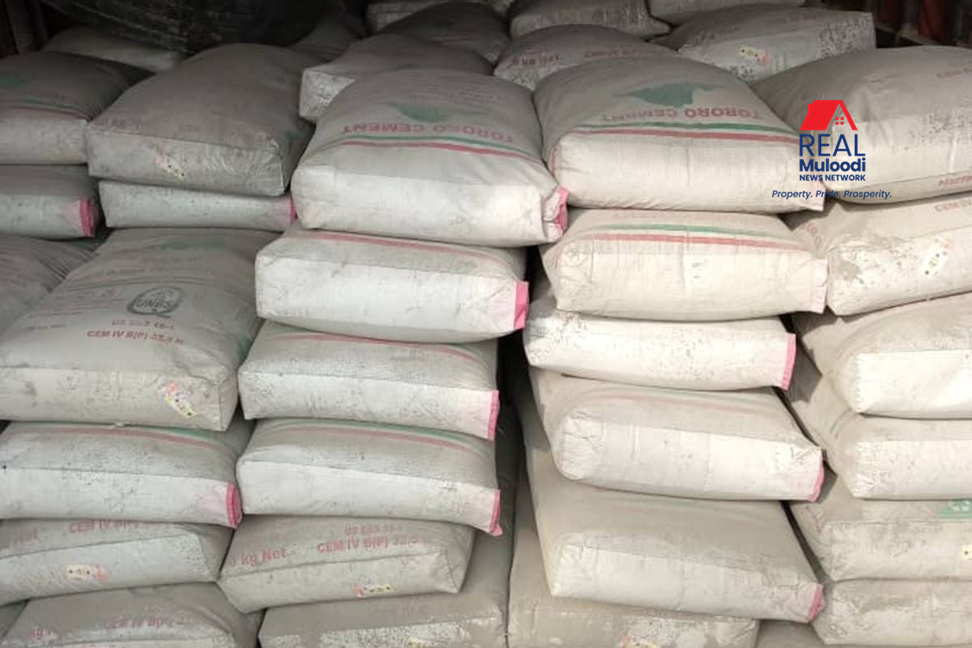UGANDA, Tororo | Real Muloodi News | Authorities in Tororo District conducted a significant operation in the first week of August 2024, targeting counterfeit cement dealers.
The operation, which involved the police, Uganda Revenue Authority (URA), and the office of the Resident District Commissioner (RDC), led to the seizure of over four tonnes of adulterated cement.
The counterfeit cement was intercepted at the Akapa trading centre, located approximately five kilometres from Tororo town along the Tororo-Jinja highway.
The seized cement, consisting of a mixture of limestone, sand, and clay, was packaged in branded bags belonging to reputable companies, including Simba Cement, Tororo Cement, and Hima Cement.
According to Mr Albert Amula, the Deputy Resident District Commissioner for Tororo who led the operation, the counterfeiters had also replicated digital stamps to make the products appear authentic.
“The operation was intelligence-led, prompted by a tip-off from trusted whistleblowers regarding the manufacturing of fake cement in the area,” Mr Amula stated.
The authorities believe that the arrested individuals are part of a larger network involved in the production and distribution of counterfeit cement in the region.
A truck with registration number UAU 342W was impounded at the scene, and its driver, identified as Mathew Wandera Othieno, was taken into custody.
Mr Amula expressed hope that the arrested driver would provide information leading to the apprehension of the main perpetrators behind the illegal trade.
Investigation and Further Action
Following the successful operation, Mr Amula urged the police to conduct a thorough investigation to identify the primary actors in the counterfeit cement business and to trace the source of the packaging materials used.
He emphasised the importance of cracking down on the entire supply chain to prevent the continued distribution of adulterated cement to unsuspecting consumers.
The counterfeit cement, sold at prices ranging between 26,000 and 28,000 shillings per bag, is believed to have been distributed to various construction sites in the region.
In many instances, accomplices collaborate with construction site managers to dilute the cement intended for building projects and then sell the surplus at lower prices.
Mr Amula highlighted the dangers associated with the use of substandard construction materials, noting the potential for building collapses and other structural failures.
He urged contractors and consumers to purchase construction materials only from licensed hardware stores to ensure they are obtaining quality products.
“Cement dealers who engage in the sale of counterfeit products are putting lives at risk by providing substandard materials that compromise the integrity of construction projects,” Mr Amula said.
Response from Cement Manufacturers and Industry Stakeholders
Cement manufacturers in the region, including those whose brands were used in the counterfeit operation, have expressed concern over the proliferation of fake cement in the market.
They have called for stricter regulations and more robust enforcement to combat the illegal trade.
A representative from Tororo Cement, speaking on behalf of the company, stated, “We are deeply concerned about the impact of counterfeit cement on both our brand and the safety of construction projects in the region. We urge the authorities to take decisive action against those involved in this illicit trade.”
The company also emphasised the importance of public awareness, encouraging consumers to be vigilant and to report any suspicious activity related to the sale of cement.
“Consumers need to be aware of the risks associated with purchasing counterfeit products and should always buy from reputable and licensed dealers,” the representative added.
Challenges in Combating Counterfeit Cement Trade
The ongoing issue of counterfeit cement dealers has been a challenge for authorities in Tororo District and across Uganda. The illicit trade is fueled by weak regulatory enforcement, corruption, and the high demand for affordable construction materials.
A construction site manager in Tororo, who requested anonymity, expressed frustration over the recurring nature of the problem.
“The issue of counterfeit cement has been going on for years, and despite arrests, the culprits are often released without facing significant consequences. This lack of accountability allows the illegal trade to continue,” the manager said.
The manager also pointed to loopholes in the legal framework that make it difficult to secure convictions and impose stringent penalties on those involved in the counterfeit cement trade.
“There is a need for stronger laws and better enforcement to ensure that those who engage in this illegal activity are held accountable,” the manager added.
Impact on the Construction Industry
The sale and use of counterfeit cement have serious implications for the construction industry in Uganda. Buildings constructed with substandard materials are at a higher risk of collapse, posing a threat to the safety of occupants and the public.
Counterfeit cement can lead to long-term structural issues, resulting in higher maintenance costs and reduced building lifespans.
Industry stakeholders have called for increased collaboration between the government, law enforcement agencies, and the private sector to address the issue effectively. This includes strengthening regulations, improving oversight of the supply chain, and raising public awareness about the dangers of counterfeit cement.
“Cement dealers and other stakeholders in the construction industry must work together to ensure that only genuine, high-quality materials are available in the market,” said a representative from the Uganda National Bureau of Standards (UNBS). “We are committed to supporting efforts to eliminate counterfeit products and to protect the integrity of the construction industry in Uganda.”
As investigations continue, authorities are focused on identifying the main perpetrators behind the counterfeit cement operation and dismantling the network responsible for its production and distribution.
The cooperation of the public, law enforcement, and industry stakeholders will be crucial in addressing the issue and ensuring the safety and integrity of construction projects across the region.
READ MORE LIKE THIS:
Cement Smuggling Casts Shadows on Uganda’s Real Estate and Construction



